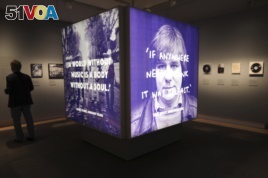12 July, 2019
The image of a lion, about the size of a large piece of bread, represents the latest step in the fight to save culture from conflict.
The lion is a reproduction of The Lion of Mosul, a 3,000-year-old statue from the Temple of Ishtar in what is now Iraq. The stone statue was one of many objects from the Mosul Museum destroyed by the Islamic State militant group after it seized the city in 2014.
The Lion of Mosul reproduction can be viewed online. It was modeled from pictures taken by Mosul Museum visitors. The lion was 3-D printed as part of Google's digital arts and culture project.
The reproduction is at London's Imperial War Museum. It is part of an exhibition that explores how war destroys the culture of societies and how people take steps to preserve it.
Chance Coughenour is a digital archaeologist at Google Arts and Culture. He said the exhibition shows how technology can be used to save culture and to tell the stories of societies in new and interesting ways.
Paris Agar is with the Imperial War Museum. She told the Associated Press that the destruction of culture is almost an accepted part of war. She said, "One of the main reasons for destroying culture is to send a message: We have victory over you. We have power over you. It's because culture means so much to us; if we didn't care it wouldn't be a tool."

Part of the 'Rebel Sounds' exhibition, which explores how people used music to resist and rebel against war and oppression, is displayed at the Imperial War Museum in London, Wednesday, July 3, 2019.
Efforts to destroy and save culture
The most surprising parts of the exhibition are the records made by those who destroy or steal cultural objects. They include lists of artwork stolen by Nazi German soldiers during World War II. Other records include video of Taliban militants blowing up Afghanistan's 1,000-year-old Bamiyan Buddhas and video of the Islamic State destroying statues in the Mosul Museum
The exhibition covers more than 100 years, from the German army's destruction of the university and library of Leuven, Belgium during World War I to the bombing of the National and University Library in Sarajevo during the Bosnian war in 1992.
The exhibition also shows the work of the World War II Monuments Men, who saved artworks stolen by the Nazis. In addition, the show tells the story of Khaled al-Asaad, who devoted his life to studying Syria's ancient site of Palmyra. He was killed by the Islamic State in 2015.
Internationally supported projects to train craftspeople and scientists in Syria and Iraq may help those countries recreate what has been lost.
And international law is expanding to include cultural destruction. In 2016, Islamic extremist Ahmad Al Faqi Al Mahdi was found guilty of destroying World Heritage cultural sites in Timbuktu, Mali. It was the first war-crimes conviction by the International Criminal Court for cultural destruction.
The show is one of three related exhibitions at the museum called Culture Under Attack. The second looks at how British museums moved their treasures from London to keep them safe during World War II. The third, Rebel Sounds, explores music as resistance in countries across Europe and Africa
The Culture Under Attack exhibition is free and will be shown until January 5.
I'm Jonathan Evans.
Jill Lawless reported this story for the Reuters news service. Jonathan Evans adapted it for Learning English. Mario Ritter Jr. was the editor.
________________________________________________________________
Words in This Story
exhibition – n. an event at which objects such as works of art are put out in a public space for people to look at; a public show of something
devote – v. to decide that something will be used for a special purpose; to use time, money, energy, attention, etc. for something
conviction – n. the act of proving that a person is guilty of a crime in a court of law